You need two things to be an accomplished fly fisher. The first, of course, is knowledge. If you don’t know where the trout live, or what they eat, or which fly to choose, it’s awfully tough to enjoy consistent success.
The wonderful thing about knowledge, of course, is that it’s available from so many different sources. Magazines like this one, for example, publish new “how-to” articles on a regular basis. There are hundreds and hundreds of fly fishing videos. There’s the guy or gal behind the counter at the fly shop. There are your friends and fishing partners, not to mention the folks from your local TU chapter. There are guides, outfitters and fly fishing schools, as well as more “how-to” books than most of us could hope to read in a lifetime. And we shouldn’t ignore the knowledge we accumulate from our own personal experiences when we’re out on the water. Those experiences are incredibly important.
In any case, there are myriad places where we can find the information that will help increase our fly fishing success.
The second thing we need in order to become consistently successful anglers is skill. And skill is a different animal altogether.
While skill requires knowledge, knowledge alone won’t cut it. There’s a distinctly physical component to skill that exists in its own separate, if parallel, fly fishing universe.
Most of us have seen skilled anglers on occasion. They cast beautifully, they move with a combination of grace and stealth, they present their flies without drag or difficulty to the point where they make their fishing look easy. Oh, and they catch far more trout than other anglers.
There are two main ways to gain that type of skill. One is repetition. We do something over and over and over, experimenting, making adjustments both large and small, until we finally reach the point where our skills become manifest and our muscle memory locks in.
If, that is, we’re lucky. Because for every person who manages to work it out on their own with their buddies or their books or their YouTube videos for guidance, there are any number of less-fortunate souls who never fulfill their potential. Whatever skills they may develop are seriously flawed and their angling never quite manages to transcend those flaws. Sadly, most of those individuals fail to become the fly fishers they hope to be.
The second way to develop our skills also involves repetition. And practice, And perseverance. But this particular perseverance is augmented by someone — a teacher or instructor or mentor — with the ability and talent to help correct our mistakes and develop the muscle memory that’s a prerequisite for successful fly fishing.
Skills — the ability to cast accurately, or to get the exact drift you need, or to tie a perfect fly, or to read a river like a book — don’t just happen. They certainly don’t appear at the front door like a package from Amazon. As Tiger Woods once said about golf, “Talent is something you are born with, and a skill is something you develop. 99% of what you need to succeed in golf are skills.” The same, of course, is true for fly fishing.
Some fly fishers are able to devote a truly prodigious amount of time and effort to honing their skills on their own. Others are fortunate to have a parent, sibling or friend who actually knows what he or she is doing, and who is willing to coach, and to teach, and to share. For the rest of us, though … well, we either do the best we can, knowing that fly fishing will remain fun regardless of how well or poorly we fish, or we turn to professionals.
I’ve always been surprised at how few fly fishers avail themselves of professional instruction. In other sports — golf, for example, or tennis, or skiing — a relatively high percentage of participants take lessons in order to establish a strong foundation and set themselves on the path to mastery. For whatever reason, though, that’s not the case with fly fishing.
So if you’re interested in giving yourself an advantage on the water, and if you don’t have a friend or family member with stellar fly fishing and teaching credentials, you might consider bucking that aforementioned trend and either hiring an instructor or attending a fly fishing school. Orvis runs short fly fishing classes all over the country. Fly Fishers International maintains a directory of certified casting instructors. There are also several high-end fly fishing schools that offer longer classes emphasizing important skills.
I’ve been teaching fly fishing and fly casting for more than 30 years now, and I’ve been fortunate enough to watch some truly exceptional instructors help their students develop and lock in their skills. It always puts a smile on my face to see people grow and improve under the tutelage of someone who really knows what they’re doing.
Not that skill or proficiency are absolutely necessary. You don’t have to be a great angler to have fun with your fly fishing. But the better your skills, the more you’re likely you are to enjoy yourself on the water.




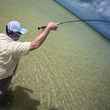
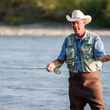


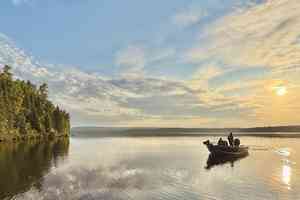


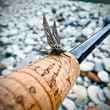

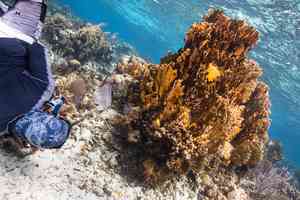


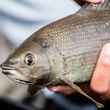



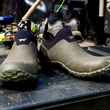

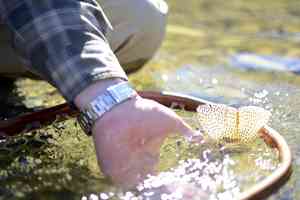
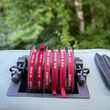


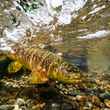
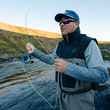


Comments
Rick B. replied on Permalink
There are a host of skills that make for successful fly fishing on rivers and streams.
The skill of fly casting must be paired with the skill of line control/management which is much harder to teach and gets little attention. Line control is best learned through experience and the learning curve can be very shallow. Same for hook setting and fighting bigger fish - two skills which are a by-product of line control (and knowledge).
Rick B. replied on Permalink
Regarding that Tiger Woods quote. Like many gifted athletes and musicians, they tend to underrate the importance of natural aptitude/talent. Those of us less gifted will plateau out well before we become a Tiger Woods or a Billy Strings. the goal is to get a good as possible until the learning curve flattens out.
Rip Lip replied on Permalink
That was the worst article I have ever read.... I want my 4 minutes back....
Chad Shmukler replied on Permalink
Pages